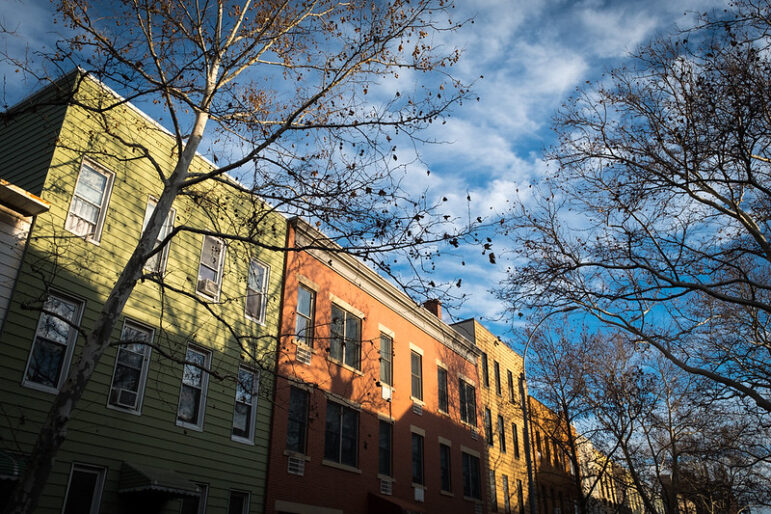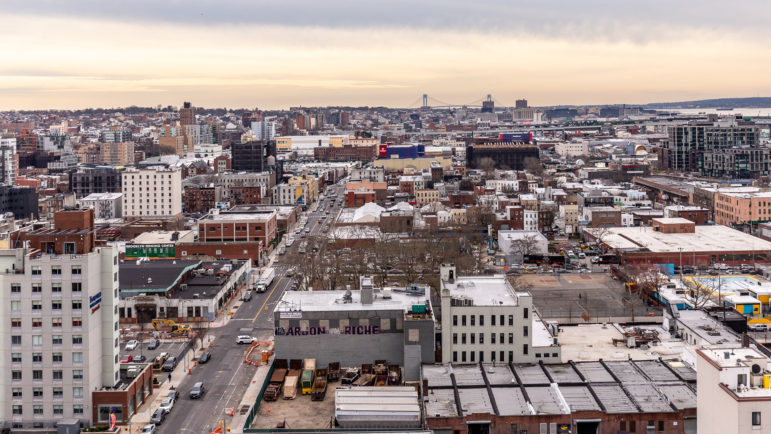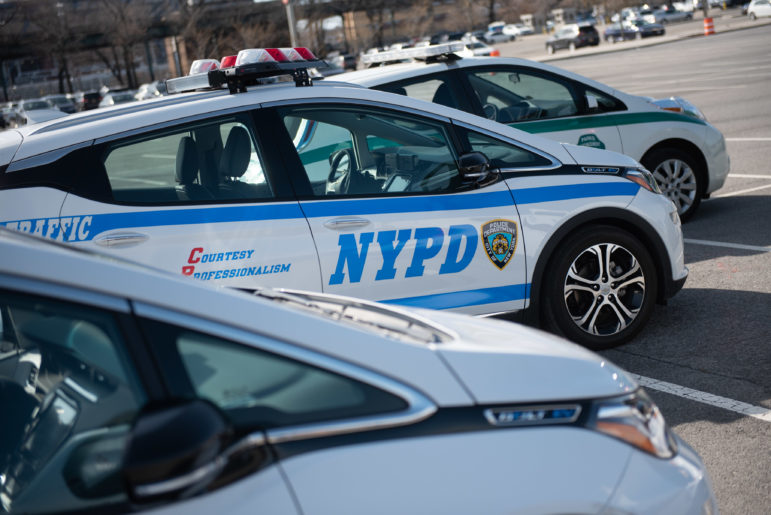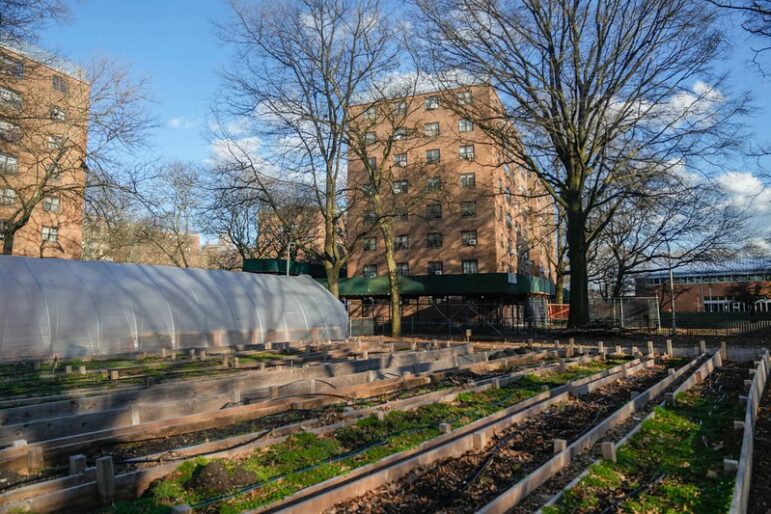At a a recent hearing, members of the NYC Banking Commission heard from advocates who described redlining, predatory and discriminatory lending practices, and substantial investments in the fossil fuel industry by major banks applying to hold tens of millions of city dollars. Yet the commission promptly approved all of the nearly 30 banks that applied.
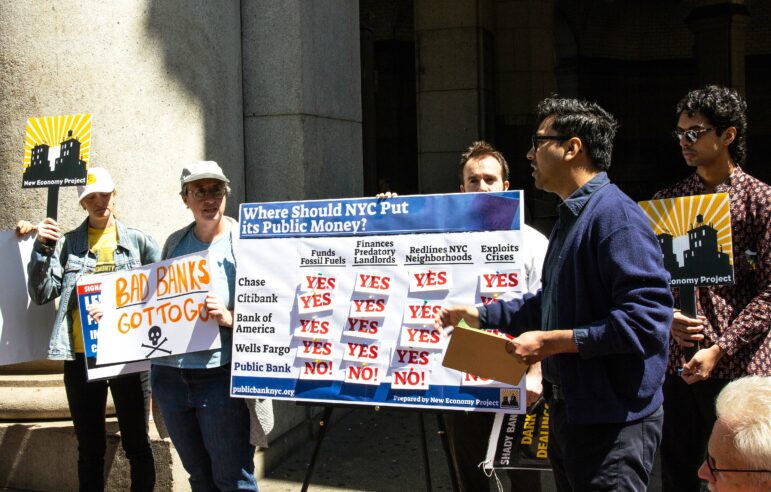
Doug Turetsky
Tousif Ahsan, public banking campaign coordinator at New Economy Project, pointing out controversial practices of some of the big banks where NYC deposits over $100 billion in annual revenues.“Too often we think banking has nothing to do with democracy,” said State Senate Banking Committee Chair James Sanders at last week’s hearing of the New York City Banking Commission.
But banking and democracy were on full, if not always fulsome, display at the hearing as the commission decided which banks would be eligible to receive more than $100 billion in annual city agency deposits over the next two years. For the first time, the commission accepted public testimony before voting on which banks could hold city dollars.
The Banking Commission’s three members—the mayor, comptroller and finance commissioner (or in practice, their designees)—heard testimony by advocates from housing, environmental and social justice organizations describing redlining, predatory and discriminatory lending practices and substantial investments in the fossil fuel industry by major banks applying to hold tens of millions of city dollars.
Following the public comments, city treasurer and finance department designee Mary Christine Jackman thanked speakers for their testimony, and Annie Levers, the comptroller’s representative, noted that “much of what we heard should give us all pause.”
Yet rather than pause, the commission promptly approved all of the nearly 30 banks that applied, including Citi, Chase and Bank of America—among the banks that have held the most city dollars in the past and were among the main targets of criticisms by advocates.
Levers alone voted against three of the applicant banks—International Finance Bank, PNC Bank, and Wells Fargo—because their applications didn’t indicate sufficient anti-discrimination efforts in lending decisions, branch opening and closing and other operations. Just a year ago, Wells Fargo was barred from receiving city deposits after a report in The City found the bank rejected mortgage refinancing applications from Black New Yorkers at a far higher rate than other banks.
All three commission members voted to limit city deposits at Capital One and KeyBank because both failed to provide anti-discrimination plans.
Many of those who testified at the hearing commended the commission for its nascent efforts at democracy and accountability. “Today’s first-ever public hearing before the commission is a welcome change, enabling community groups and everyday New Yorkers to provide input on where the city does its banking,” said Andy Morrison, associate director of the New Economy Project.
But Morrison and others also recognized in their testimonies that input doesn’t necessarily affect decision-making, especially when a vote comes just moments after the public comments.
“This year’s process, while a good step forward, does not go far enough to ensure that the city can incorporate the findings and recommendations provided by the public into their final determinations,” said Barika X Williams, executive director of the Association for Neighborhood and Housing Development.
“It is deeply troubling and harmful that this commission would allow banks that are engaged in racial wealth extraction, predatory lending and degradation of our environment to hold our city’s money,” she added.
In some instances, bank practices may be directly opposed to city policy objectives. Several speakers noted that some of the banks with the largest deposits of city cash are also among the largest investors in the fossil fuel industry, undercutting the city’s efforts to ameliorate the effects of climate change.
City agencies had more than $515 million in deposits in Bank of America and $495 million in Chase accounts as of Feb. 28. These two banks, along with Citi and TD Bank, which also hold city cash, invested more than $1.3 trillion in fossil fuel firms in the years 2016-2022.
Despite the commission’s requirement that banks seeking city deposits demonstrate efforts to end discriminatory practices, several speakers also pointed to ongoing issues. Kyle Giller, staff attorney for the New York Public Interest Research Group, cited high overdraft and other fees collected by banks, often at the expense of low-income residents.
“During the first year of the pandemic, JPMorgan Chase—the bank that typically holds the most city deposits—charged $1 billion in predatory fees from struggling New Yorkers,” said Giller.
Chase and Citibank were also singled out for what is called debanking. “Over the past few years, our office has received an alarming number of complaints from individuals whose accounts were abruptly closed by Chase and Citibank without justification or explanation,” said Ahmed Mohamed, legal director of the Council on American-Islamic Relations, New York.
“These instances of debanking raise serious concerns regarding fairness and exacerbate existing economic disparities,” he added.
By both law and practicality, much of the Banking Commission’s evaluation of a bank’s eligibility to hold city deposits focuses on financial stability. The city’s deposits just don’t sit in an account waiting for an agency to make a withdrawal: the banks invest the money but must have sufficient cash on hand for agencies when they need to pay for schools, senior centers and other city services.
In the wake of the Signature Bank collapse, guidelines ensuring the fiscal soundness of banks holding city deposits were further strengthened at the urging of Comptroller Brad Lander. Clare M. Cusack, head of the New York Bankers Association, applauded the city’s efforts to ensure the safety of the city’s money.
Others were more circumspect. While no one likely wants to see the city’s tax dollars or other revenues evaporate in a bank’s collapse, Williams of ANHD cautioned that the Banking Commission has too limited a vision of “safety and soundness,” suggesting that bank lending and other practices should also be considered in terms of how they affect the safety and soundness of communities throughout the city.
But the range of the commission’s review of bank eligibility has been constrained in federal court. In 2012, the City Council passed the Responsible Banking Act, creating an advisory committee that would examine the lending and other activities of banks holding city deposits and make recommendations to the banking commission.
Then-mayor Michael Bloomberg opposed the law and refused to appoint members to the committee. Soon after Bill de Blasio became mayor, he filled the committee positions. In response, the New York Bankers Association filed suit and in 2015 federal Judge Katherine Polk Failla ruled that the banking act conflicted with state and federal statutes already regulating the banks.
Given such legal roadblocks, many of the advocates testifying before the banking commission voiced support for the creation of a public bank, modeled on the 100-year-old public bank in North Dakota. At a press conference prior to the commission hearing, supporters emphasized how a public bank would differ from the big commercial banks currently holding much of the city’s cash.
“With a public bank, created by the city and chartered to serve the public interest, we can ensure that public funds are managed accountably for the benefit of all New Yorkers,” Morrison of the New Economy Project said during the banking commission hearing. The group is coordinating a coalition of about 50 community and labor organizations that support a public bank for the city.
“It would enable the city to leverage billions of dollars toward investment in affordable housing, small and worker-owned businesses, renewable energy and other critical needs in low-income, Black, brown and immigrant communities that the big banks routinely fail to serve,” Morrison added.
But the creation of a public bank also faces a critical roadblock: Albany. State legislation is needed to authorize the city to establish the bank. While State Sen. Sanders has introduced the necessary legislation, it has languished in Albany for years.
As this year’s state legislative session winds to a close, there’s little indication that will change. Nor, at least for now, will where the city banks.


